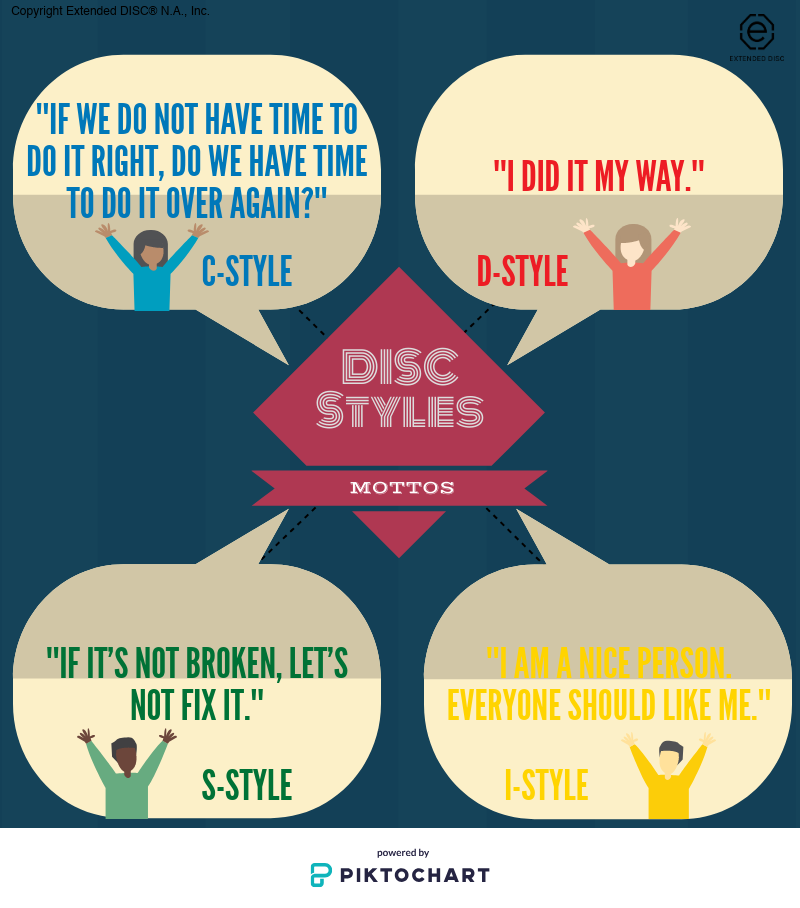Wait...how many days until the holidays?!
Are you suddenly shocked or surprised the holidays are just around the corner!? They are traditionally a busy and cheerful time, but they can also cause stress and strong emotions during our family interactions. Not to mention, we are in an uncharted and chaotic time where we could all use some help managing our stress. Helping ourselves can help everyone better focus on what's important; the joys of the holidays.
Holiday stress applies to both at work and at home. And let's face it, we tend to bring work home and home to work; in fact, many of us are actually working from home. Try as we may to separate the two; it's not possible. I'm going to share a secret you can use both at work and at home to help you survive and manage the stress of the holiday season. Your secret tool is DISC.
What is DISC?
DISC is a non-judgmental tool used to describe 4 main behavioral styles. The Extended DISC tool measures the energy it takes us to show up in a style. Is it something we do naturally; without even being aware we do it? Or, is it a style that requires effort and energy on our part?
Extended DISC Assessments help you to better understand your own natural style and how others perceive someone with your style. It's not about your abilities; DISC does not predict your success nor does it limit you. You can be any style you choose to. In fact, each of us have all four styles within us; some styles are simply more comfortable and some take more energy.
DISC applies to everything we do; both professionally and personally. The power of the tool is in the consistent application.

Once we are identifying the 4 DISC styles and building awareness of our own style, we can focus on observing the behavioral preferences of those around us. What are the similarities and differences in our motivators, actions, and intentions within our styles? We use this information to help us determine how to adjust to better interact with others. What is the cost if you don't adjust? Would it ruin the family gathering if you but heads with your grumpy Uncle Ted and it starts a heated argument and creates hurt feelings?
So, why not practice during the holidays both at work and at home? It could be the secret to helping you and your loved ones get through this holiday season. So, where do you start?
It begins with us
First, we need to look within, at what brings us holiday joy and stress. Once we have a better idea of our own joys and stressors, then we can better understand them for others.
So, what brings you joy during the holidays? Make a list and be creative with it! Write down the small things and the big things that bring you joy; make sure they're realistic so they don't end up causing you stress! Then, choose at least one item from your list and make sure you practice it during the holiday season. Celebrate your small successes because they can add up.
Here's a list of things that bring me joy during the holidays:
- Baking cookies
- Spending time with family
- Doing an act of service or charity
- Listening to Christmas carols
- Seeing the lights fill the darkness of the longer winter nights
- Sipping hot cocoa
- Reading by the fireplace

Now, think back over the past years about what tends to cause you stress during the holidays. What are those most dreadful moments? Again, be specific with your list. It will help you know what to avoid or adjust. Here are some of my stressors:
- Family conflicts
- Last minute shopping or wrapping presents
- Feeling obligated to bake
- Changes in plans
Your lists of joys and stressors can help you better prepare and quite possibly, help others better understand you.
Based on my holiday joys and stressors, can you identify my DISC style?
Make your own list first
Next, think about family members and co-workers you will be interacting with, either in person or virtually, over the holiday season. Identify what their main DISC style may be. Now, make a plan to avoid any stressors on their lists. How can you help them find holiday joy? What could you do? Furthermore, be on the lookout for any signs of stress you may see in them. Recognizing stress early can help both, you and the individual, manage if more effectively.
Here are some additional tips to help you:
- Have a self-care plan
We need to remember always to take care of ourselves; especially during stressful busy times. You are more equipped to take care of others when you take care of yourself first. Self-care will look and sound different for each person. That's okay. Make sure you have a plan that works for you.
- Know your stressors
Knowing what triggers your stress, allows you to create a plan to overcome them. Have a plan in place and practice it if needed. If nothing else, always remember to breathe! - Have backup
Who's your lifeline when the going gets tough? Do you have a signal for help and rescue? Have a plan in place. Don't face it alone. Get others involved to help you.
Stressors will always be there. DISC provides a way to understand ourselves and others better so we can better manage the stress and have more time to focus on our joys. Are you ready for the holidays?
